The Labour Party is a social-democratic political party in the Netherlands.

The Christian Democratic Appeal is a Christian-democratic and socially conservative political party in the Netherlands. It was originally formed in 1977 from a confederation of the Catholic People's Party, the Anti-Revolutionary Party and the Christian Historical Union; it has participated in all but three cabinets since it became a unitary party.
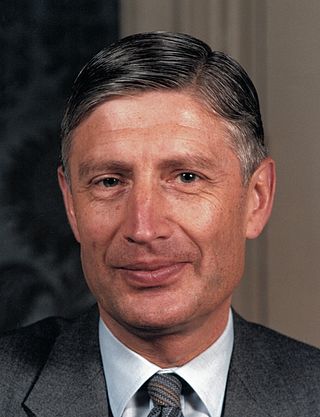
Andreas Antonius Maria "Dries" van Agt is a Dutch politician and diplomat of the Catholic People's Party (KVP) and later its successor the Christian Democratic Appeal (CDA) party and jurist who served as Prime Minister of the Netherlands from 19 December 1977 until 4 November 1982.

The Anti-Revolutionary Party was a Protestant conservative and Christian democratic political party in the Netherlands. The party was founded in 1879 by Abraham Kuyper, a neo-Calvinist theologian and minister. In 1980 the party merged with the Catholic People's Party (KVP) and the Christian Historical Union (CHU) to form the Christian Democratic Appeal (CDA).
The Catholic People's Party was a Catholic Christian democratic political party in the Netherlands. The party was founded in 1945 as a continuation of the Roman Catholic State Party, which was a continuation of the General League of Roman Catholic Caucuses. During its entire existence, the party was in government. In 1977, a federation of parties including the Catholic People's Party, the Anti-Revolutionary Party (ARP) and the Christian Historical Union (CHU) ran together under the Christian Democratic Appeal (CDA) banner. The three participating parties formally dissolved to form the CDA in 1980.

General elections were held in the Netherlands on 15 May 1963. The Catholic People's Party (KVP) remained the largest party, winning 50 of the 150 seats in the House of Representatives.
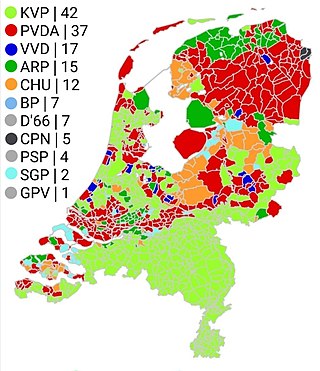
General elections were held in the Netherlands on 15 February 1967. The Catholic People's Party (KVP) remained the largest party, winning 42 of the 150 seats in the House of Representatives.
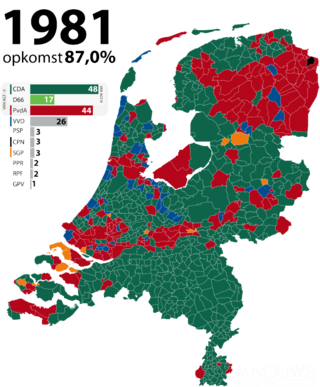
General elections were held in the Netherlands on 26 May 1981. The Christian Democratic Appeal (CDA) emerged as the largest party, winning 48 of the 150 seats in the House of Representatives.
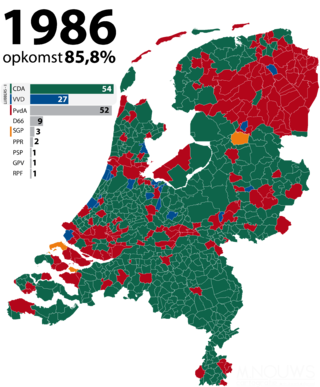
General elections were held in the Netherlands on 21 May 1986. The Christian Democratic Appeal (CDA) emerged as the largest party, winning 54 of the 150 seats in the House of Representatives.

General elections were held in the Netherlands on 3 May 1994. The Labour Party emerged as the largest party, winning 37 of the 150 seats in the House of Representatives. The election resulted in significant losses for both the Labour Party and the Christian Democratic Appeal. The two liberal parties, People's Party for Freedom and Democracy and Democrats 66 made large gains, whilst two pro-elderly parties and the Socialist Party all passed the electoral threshold to win seats.

The Christian Historical Union was a Protestant Christian democratic political party in the Netherlands. The CHU is one of the predecessors of the Christian Democratic Appeal (CDA), into which it merged in September 1980.
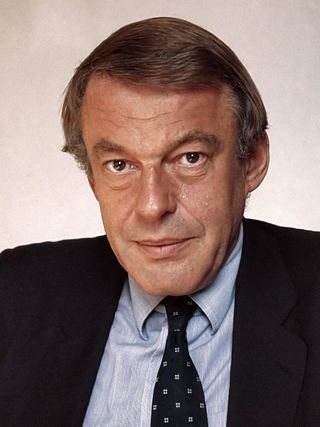
Henricus Antonius Franciscus Maria Oliva "Hans" van Mierlo was a Dutch politician and journalist who co-founded Democrats 66 (D66).

The Political Party of Radicals was a Christian-radical, progressive Christian and green political party in the Netherlands. The PPR played a relatively small role in Dutch politics and merged with other left-wing parties to form GreenLeft in 1991.

The First Van Agt cabinet, also called the Van Agt–Wiegel cabinet was the executive branch of the Dutch Government from 19 December 1977 until 11 September 1981. The cabinet was formed by the christian-democratic Christian Democratic Appeal (CDA) and the conservative-liberal People's Party for Freedom and Democracy (VVD) after the election of 1977. The cabinet was a centre-right coalition and had a slim majority in the House of Representatives with Christian Democratic Leader Dries van Agt serving as Prime Minister. Liberal Leader Hans Wiegel served as Deputy Prime Minister and Minister of the Interior.

The Den Uyl cabinet was the executive branch of the Dutch Government from 11 May 1973 until 19 December 1977. The cabinet was formed by the social-democratic Labour Party (PvdA), the christian-democratic Catholic People's Party (KVP) and Anti-Revolutionary Party (ARP), the progressive Political Party of Radicals (PPR) and the social-liberal Democrats 66 (D'66) after the election of 1972. The cabinet was a Centre-left grand coalition and had a substantial majority in the House of Representatives with Labour Leader Joop den Uyl serving as Prime Minister. Prominent Catholic politician Dries van Agt, the Minister of Justice from the previous cabinet, served as Deputy Prime Minister until his resignation. Prominent Protestant politician Gaius de Gaay Fortman the Minister of the Interior assumed the office of Deputy Prime Minister on 8 September 1977.

The First Biesheuvel cabinet was the executive branch of the Dutch Government from 6 July 1971 until 9 August 1972. The cabinet was formed by the christian-democratic Catholic People's Party (KVP), Anti-Revolutionary Party (ARP) and Christian Historical Union (CHU), the conservative-liberal People's Party for Freedom and Democracy (VVD) and the social-democratic Democratic Socialists '70 (DS'70) after the election of 1971. The cabinet was a centrist coalition and had a slim majority in the House of Representatives with Protestant Leader Barend Biesheuvel a former Minister of Agriculture serving as Prime Minister. Prominent Catholic politician Roelof Nelissen the Minister of Economic Affairs in the previous cabinet served as Deputy Prime Minister, Minister of Finance and was given the portfolio of Suriname and Netherlands Antilles Affairs, former Liberal Leader Molly Geertsema served as Deputy Prime Minister and Minister of the Interior.

This article gives an overview of Christian democracy in the Netherlands, which is also called confessionalism, including political Catholicism and Protestantism. It is limited to Christian democratic parties with substantial support, mainly proved by having had a representation in parliament. The sign ⇒ means a reference to another party in that scheme.

Gerardus Johannes Maria "Gerrit" Braks was a Dutch politician of the defunct Catholic People's Party (KVP) and later the Christian Democratic Appeal (CDA) party and agronomist.

Roelof Johannes Hendrik Kruisinga was a Dutch politician of the defunct Christian Historical Union (CHU) party and later the Christian Democratic Appeal (CDA) party and physician.

Alphonsus Petrus Johannes Mathildus Maria "Fons" van der Stee was a Dutch politician of the defunct Catholic People's Party (KVP) and later the Christian Democratic Appeal (CDA) party and economist.



















